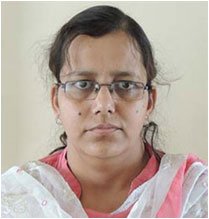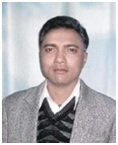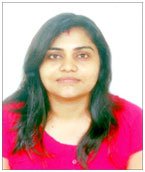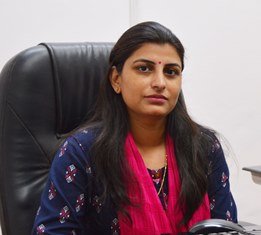Internal Quality Assurance Cell (IQAC)
From the Desk of Director , IQAC
Quality comes from continuous efforts in higher education.Internal Quality Assurance Cell (IQAC) plays a pivotal role in its building. The prime focus of IQAC is to develop an ecosystem for conscious, consistent and catalytic improvement in overall performance of the varsity, in terms of academics and administration. IQAC functions with facilitative and participative approach, and has the potential to become an engine to drive for maintaining quality assurance in a strategic & planned manner leading to multiple accreditations and rankings. Being the Director of IQAC, MU it is my prime responsibility to work cohesively with every stakeholder to enable to achieve the Vision and Mission of the University.
Best Wishes
Dr. Rajesh Kumar Upadhyay
Vision
To ensure quality culture as the prime concern for the Higher Education Institutions through institutionalizing and internalizing all the initiatives taken with internal and external support.
Objectives
- To develop a system for conscious, consistent and catalytic action to improve the academic and administrative performance of the institution.
- To promote measures for institutional functioning towards quality enhancement through internalization of quality culture and institutionalization of best practices.
Strategies
- Ensuring timely, efficient and progressive performance of academic, administrative and financial tasks;
- Relevant and quality academic/ research programmes;
- Equitable access to and affordability of academic programmes for various sections of society;
- Optimization and integration of modern methods of teaching and learning;
- The credibility of assessment and evaluation process;
- Ensuring the adequacy, maintenance and proper allocation of support structure and services;
- Sharing of research findings and networking with other institutions in India and abroad.
Functions
- Development and application of quality benchmarks
- Parameters for various academic and administrative activities of the institution;
- Facilitating the creation of a learner-centric environment conducive to quality education and faculty maturation to adopt the required knowledge and technology for participatory teaching and learning process;
- Collection and analysis of feedback from all stakeholders on quality-related institutional processes;
- Dissemination of information on various quality parameters to all stakeholders;
- Organization of inter and intra institutional workshops, seminars on quality related themes and promotion of quality circles;
- Documentation of the various programmes/activities leading to quality improvement;
- Acting as a nodal agency of the Institution for coordinating quality-related activities, including adoption and dissemination of best practices;
- Development and maintenance of institutional database through MIS for the purpose of maintaining /enhancing the institutional quality;
- Periodical conduct of Academic and Administrative Audit and its follow-up
- Preparation and submission of the Annual Quality Assurance Report (AQAR) as per guidelines and parameters of NAAC.
Benefits
- Ensure clarity and focus in institutional functioning towards quality enhancement;
- Ensure internalization of the quality culture;
- Ensure enhancement and coordination among various activities of the institution and institutionalize all good practices;
- Provide a sound basis for decision-making to improve institutional functioning;
- Act as a dynamic system for quality changes in HEIs;
- Build an organised methodology of documentation and internal communication.
Constitution of IQAC
| S.No. |
Composition of IQAC Committee |
Name |
| 1 |
Chairperson |
Prof. P. K. Dashora, Vice Chancellor, Mangalayatan University |
| 2 |
Three to Eight Members
amongst the teachers of
the University (all levels) | 1. Prof. Abdul Wadood Siddiqui, Professor, School of Pharmacy
2. Prof. Rajeev Sharma, Professor, Institute of Business Management and Commerce
3. Prof. Ravi Kant, Professor, Institute of Applied Sciences
4. Prof. Masood Parveez, Professor, Centre for Distance and Online Education
5. Prof. Dhirendar Singh, Professor, Institute of Nursing and Paramedical Sciences
6. Dr. Deepshikha Saxena, Associate Professor,Institute of Education and Research
7. Dr. Ashok Kumar Upadhyay, Associate Professor, Department of Library and Information Science
8. Dr. Soni Singh, Assistant Professor, Department of Biotechnology and Life Sciences |
| 3 |
One member from
Management |
Mr. Ashok Kumar |
| 4 |
Administrative Officers
(Members) |
1. Registrar
2. Controller of Examinations
3. Finance Officer |
| 5 |
Nominee from Local
Society, Student and
Alumni (Members) |
1. Mr. Kunwar Raj Singh, Chairman- Beswan, Aligarh (Local Society)
2. Mr. Ananya Varshney, B.Tech. CSE (Student)
3. Dr. Raj Kumar, Director, Sales Heroes (Alumni) |
| 6 |
Nominee from
Employers/Industrialist
/Stakeholders
(Members) |
1. Mr. Vishal Goyal, Noida (Employer)
2. Mr. Mukesh Kumar Goyal, Delhi (Industrialist)
3. Mr. Virendra Agrawal, Beswan, Aligarh-202145 (Parent) |
| 7 |
Director of the IQAC |
1. Dr. Rajesh Kumar Upadhyay,
2. Associate Professor,
3. Department of Electrical & Electronics Engineering |
| 8 |
Special Invitees |
As per invitation |
Core Team of IQAC
| S.No. |
Name of Members |
Responsibilities (NAAC-SSR) |
Photos |
| 1 |
Dr. Rajesh Kumar Upadhyay |
IQAC - Director |
 |
| 2 |
Dr. Deepshikha Saxena |
Criterion – I |
 |
| 3 |
Prof. Anurag Shakya |
Criterion – II |
 |
| 4 |
Dr. Deepmala |
Criterion – III |
 |
| 5 |
Mr. Mohan Maheshwari |
Criterion – IV |
 |
| 6 |
Dr. Soni Singh |
Criterion – V |
 |
| 7 |
Ms. Shweta |
Criterion – VI |
 |
| 8 |
Mr. Shubham Sharma |
Criterion – VII |
 |











